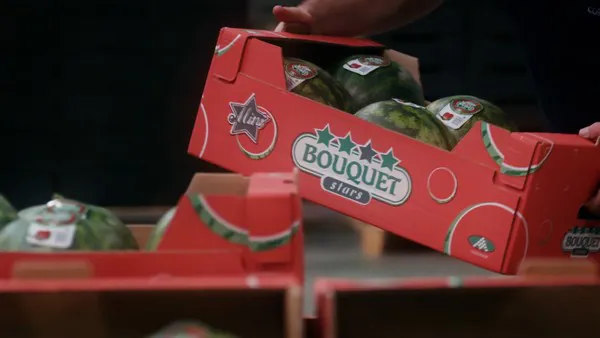The factors that negatively affected the development of Almeria's greenhouse melon and watermelon campaign this year have dissipated, creating a much more favorable outlook for both fruits in this second part of the domestic campaign, which is currently underway in the open ground fields of Murcia and Valencia.
"Almeria's campaign has been much more difficult than we expected due to the weather, both at origin and destination," says Carlos Nemesio, commercial manager of Anecoop's Watermelon Program.

"At origin, there have been issues with the quality due to the weather in April. In fact, a few weeks ago, a report confirmed that April 2021 was the rainiest month in the last 25 years. At destination, the weather has not been ideal to promote consumption. Besides, there has been fruit from overseas available until practically the end of May, with imports from different origins and Brazil there until the very last moment. Brazil usually finishes earlier, but on May 20 there were still a lot of Brazilian melons and watermelons arriving in Europe," says Carlos.
"It has been a very difficult campaign for Almeria's growers, after a tough year also for vegetable production. Although not much is said about it, the cucumber virus is also doing a lot of damage to watermelons in Almeria. It is quite concerning, and if a solution isn't found soon, future productions could be jeopardized," says Carlos Nemesio.
These factors have had an impact on the prices of Almeria's fruit, causing the total value of the production to plummet compared to last year, despite an increase in the province's volumes this season. However, the entry into production of Spanish open ground fields has coincided with an upturn in temperatures across Europe that has changed the situation for both fruits.
"The situation has improved commercially and prices have finally started to rise," says the professional. "Between the end of week 23 and the beginning of week 24, the campaign in Almeria pretty much came to an end, so right now the supply on the market is that of the Spanish open ground productions. The supply at the beginning of this second part of the campaign has been lower than expected due to a decline in the early yields and some delay in the harvest, and although there have been no gaps in the watermelon supply, as Almeria had planted a lot for the end of the campaign, in the case of melons there has been some imbalance between the supply and the demand, especially with the Cantaloupe and Galia."
This year, Anecoop has chosen to increase its watermelon volumes by boosting their production in the final part of the campaign, in the producing areas of Castile-La Mancha. The total supply is expected to increase by 10%. This also applies to mini watermelons. "In Europe, there are few countries that sell melons and watermelons by kilos, as is done in Spain. The trend is to sell them by the piece, and this means that mini varieties play a very important role." Even more so for a company that is strongly export-oriented and which ships approximately 75% of its watermelon production to international markets. In fact, Anecoop is the leading marketer of this fruit at European level.

However, the domestic market yielded very good results last year. Watermelon sales amounted to 36 million kilos, far exceeding the 28 million kilos marketed in the previous season, says Carlos Nemesio. "This has been achieved despite the fact that many millions of tourists stopped coming to Spain," he says. "And this year, watermelon sales actually stand well above last year's."
Bouquet Premium Piel de Sapo melon
The cooperative group is a European leader in the watermelon market, selling the fruit under its well-known Bouquet brand. It has also now embarked on a project to increase its melon production and become a more relevant operator in this segment. "On the medium term, the project will focus on the 4 kinds of melon, but for now we have started with the Piel de Sapo. Our objective was to launch a product that would reach the highest standards, meeting the demands of brand-oriented customers. Taking advantage of the reputation of the Bouquet Premium watermelons, we have launched the Bouquet Premium Piel de Sapo melons. We have already introduced this new melon brand in different places in the domestic market and it is doing very well."
"Anecoop produced between 22 and 23 million kilos of melons last year, compared to the 142 million kilos obtained in the case of watermelons. We are still far from having our melon and watermelon productions at a similar level, but the goal is to grow little by little and introduce the rest of the varieties in the coming seasons," says Carlos.
For more information: anecoop.com
